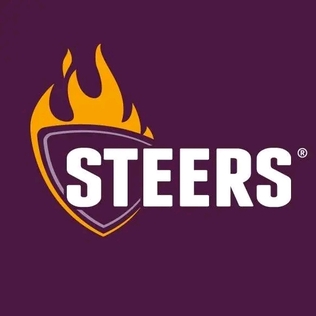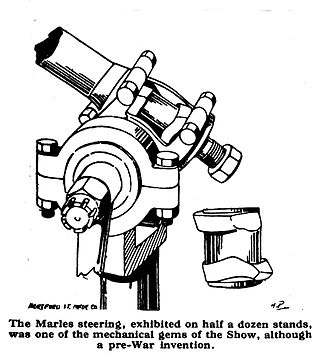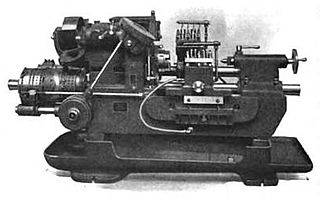
Vauxhall Motors Limited is a British car company headquartered in Chalton, Bedfordshire, England. Vauxhall became a subsidiary of Stellantis in January 2021, having previously been owned by General Motors since 1925.
Hardy Spicer is a brand of automotive transmission or driveline equipment best known for its mechanical constant velocity universal joint originally manufactured in Britain by Hardy employing patents belonging to US-based Spicer Manufacturing. Hardy and Spicer soon became partners. Later Spicer became Dana Holding Corporation.

Sunbeam Motor Car Company Limited was a British automobile manufacturer in operation between 1905 and 1934. Its works were at Moorfields in Blakenhall, a suburb of Wolverhampton in Staffordshire, now West Midlands. The Sunbeam name had originally been registered by John Marston in 1888 for his bicycle manufacturing business. Sunbeam motor car manufacture began in 1901. The motor business was sold to a newly incorporated Sunbeam Motor Car Company Limited in 1905 to separate it from Marston's pedal bicycle business; Sunbeam motorcycles were not made until 1912.
R.T. Quaife Engineering, Ltd. is a British manufacturer of automotive drivetrain products. It designs and manufactures motorsport and performance orientated gearboxes, gearkits, differentials, steering racks and axle kits, along with many other associated drivetrain products.
The Lanchester Motor Company Limited was a British car manufacturer in active trade between 1899 and 1955. Though the Lanchester Motor Company Limited is still registered as an active company and accounts are filed each year, the marque has been dormant since. As of 2014 it is marked as "non-trading".
Lucas Industries plc was a Birmingham-based British manufacturer of motor industry and aerospace industry components. Once prominent, it was listed on the London Stock Exchange and was formerly a constituent of the FTSE 100 Index. In August 1996, Lucas merged with the American Varity Corporation to form LucasVarity.

A preselector gearbox is a type of manual transmission mostly used on passenger cars and racing cars in the 1930s, in buses from 1940–1960 and in armoured vehicles from the 1930s to the 1970s. The defining characteristic of a preselector gearbox is that the gear shift lever allowed the driver to "pre-select" the next gear, usually with the transmission remaining in the current gear until the driver pressed the "gear change pedal" at the desired time.
Bedford Vehicles, usually shortened to just Bedford, was a brand of vehicle manufactured by Vauxhall Motors, then a subsidiary of multinational corporation General Motors. Established in April 1931, Bedford Vehicles was set up to build commercial vehicles. The company was a leading international lorry brand, with substantial export sales of light, medium, and heavy lorries throughout the world.

E G Wrigley & Co Limited was a British tool maker, car component, and mechanical parts manufacturer, located at Foundry Lane, Soho, Birmingham active from 1897 to 1923.

Steers is a South African quick-service restaurant brand, serving burgers and chips. Other menu items include chicken burgers, ribs, ice cream, milkshakes, chicken and salads.
Teletouch is the trade name for the transmission controls found on many Edsel brand automobiles manufactured by the Edsel and Mercury-Edsel-Lincoln (M-E-L) Divisions of the Ford Motor Company. The significance of the Teletouch systems lies in its conception, design and symbolism for American automobiles produced in the 1950s, and the gadgets designed into them. The main distinguishing feature of the system was its use of push buttons on the steering wheel to shift gears as opposed to a gear stick.

The New Hudson Cycle Co. was originally started in 1890 by George Patterson, and manufactured 'safety' bicycles in Birmingham. In 1903 they produced their first motorcycle, but times became tough for Patterson after one of his sons died in WW1 and the other lost a leg. The family sold the factory to HJ Bructon after WW1, and in 1920 the company was reformed as New Hudson Ltd.

Leagrave is a former village and now a suburb of Luton, in the Luton district, in the ceremonial county of Bedfordshire, England, in the northwest of the town. The current council ward is roughly bounded by Vincent Road, Torquay Drive and High Street to the north, Roman Road and Stoneygate Road to the south, the M1 to the west, and Marsh Road and Leagrave Park to the east.

Marles steering gear was an hour-glass-and-roller steering gear for mechanically propelled vehicles invented by British inventor and businessman Henry Marles (1871-1955) who also gave his name to his joint-venture Ransome & Marles a major British ball-bearing manufacturer. Aside from ease of use Marles' steering's great appeal to drivers was its lack of backlash.

In metalworking and woodworking, an automatic lathe is a lathe with an automatically controlled cutting process. Automatic lathes were first developed in the 1870s and were mechanically controlled. From the advent of NC and CNC in the 1950s, the term automatic lathe has generally been used for only mechanically controlled lathes, although some manufacturers market Swiss-type CNC lathes as 'automatic'.
Hydrosteer was the name given by George Kent Ltd and Cam Gears Limited through Hydrosteer Limited of Luton, England, to its automotive power steering system. Initially Hydrosteer manufactured the Ross-Link system for commercial vehicles from 1953 under licence from Ross Gear and Tool of U.S.A. Their own product available from 1961 was based on a cam and peg system and was characterised by its fully integrated design and variable steering ratio. This configuration provided automotive manufacturers with a fairly simple design modification to provide a power steering option for cars fitted with a conventional cam and peg steering box. It was fitted to several, mainly British, luxury automobiles of the era. Production continued up to 1973, with just over 105,000 units being produced. As a "first generation" assistance system, applications were somewhat varied in their tuning of the many system dynamics to the specific vehicle. The system fell out of use as powered rack and pinion steering systems gained in popularity.

The Vauxhall 23-60 is a four or five-seater touring car manufactured by Vauxhall of Luton that was announced in July 1922. The 23-60's standard tourer Kington body was described as "preserving that greyhound look so characteristic of the Vauxhall car". It shared many parts with Vauxhall's much more powerful 30-98.

Rane (Madras) Ltd is a part of the Rane group of companies involved in the manufacture and distribution of steering and suspension systems. The main components manufactured by the company include Manual Steering Gear Products (SGP) and Suspension & Steering Linkage Products (SSLP). The other products include tie rod assemblies, drag link assemblies, center link assemblies and gear shift ball joints. Automobile companies that use its products include Ashok Leyland, Volvo, M&M, Tafe, Tata among many others. Tata motors remains its major customer and is the primary parts manufacturer for Tata's Nano. The company has also set up a dedicated plant for Tata Nano in Sanand, Gujarat. The company was forced to change its manufacturing facility from West Bengal to Gujarat after Tata moved out.

Lewis Electruk was a British marque of milk floats, produced by T H Lewis Ltd, a company which had close ties with Express Dairies, the London-based retail milk company. They made pedestrian controlled vehicles (PCVs) and ride-on vehicles between 1934 and 1961. The manufacturing of battery electric road vehicles was then sold on to Morrison-Electricar who continued to build two Electruk models for the dairy industry. Major purchasers of their products included Express Dairies and the London Co-operative Society.
Founded in 1838, George Kent Ltd was initially a manufacturer of household gadgets, then a manufacturer of munitions during World War One, and became the largest British manufacturer of instruments for industrial control systems, prior to its acquisition by Brown Boveri in 1974.











